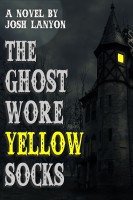The Brief History of the Dead - Brockmeier Kevin (книги бесплатно без регистрации TXT) 📗
SEVEN. THE PATRIARCH
The wind stopped along with the rains, and the silence kept him awake for most of the night, and in the morning he opened the two doors and chose his sign for the day and shooed the Laura birds off the balcony, watching them drop like styrofoam balls to the benches and the dirty pavement. Their blue-and-gray tails twitched in the yellow light, and though the birds were demons, the light was good, and he took his sign and carried it out into the city. When he came to the gathering place, he shouted, "You, my brothers! You, my sisters! If you listen, you will hear, and if you seek, you will find!" and while most of the people brushed him aside, and some even derided him, crowing out their profanities, there were always a few who stopped to listen.
"Do you really believe that?" they asked him, and "Find what?" they said, and, "What does that sign of yours mean, anyway?"
Today what his sign said was, IF I WILL THAT HE TARRY TILL I COME, WHAT IS THAT TO THEE?, and it meant the same thing that all his signs meant: Jesus is returning, so you'd better prepare yourself. "It's John 21:22," he tried to explain. "The Lord is speaking to his disciples. Most people think that the verse refers to the Wandering Jew, but if you read it carefully, you'll see that it doesn't. The 'he' in question is actually the apostle John. Tarry means wait, and wait means live. So the verse means, 'If I, Jesus, will that he, the Apostle John, live till I come, what is that to thee, my disciples?' Which is to say Jesus's disciples, not mine. I'm not Jesus. Do you understand?"
It was a complicated question, and so he would repeat his explanation a second time, and then a third if he still saw a flicker of confusion on their faces, and sometimes a fourth if other people had begun to tarry nearby, and usually he would finish only to find that everybody had drifted away, shepherded from the true sound of his voice by the noise of the birds.
And so he would move once more into the crowds, and start over again, and wait for the people to gather around him.
The people were created in the image of God, and thus they were within the precinct of His grace, even the ones who did not know Him, the ones who withdrew themselves from His presence. It was something he had to remind himself of when they ignored him, or jeered at him, or parroted his voice, or even, as had happened once or twice in the other world, when they arrested him, handcuffed him, and confiscated his sign. Sometimes, when he sensed the spirit of God moving inside him, turning over like a soft bundle of clothing, he would feel so satiated that he would forget to feed himself, and late in the day his legs would buckle underneath him inside the swim of his own hunger. There was a mail carrier, a good man named Joseph, who would offer him a hot dog or a slice of pizza at such times and wait with him until he could stand again without feeling faint. Today, though, he had filled his pockets with bread sticks before he left for the city. He ate them sitting on an iron bench in sight of the obelisk, where he watched the shadows of the birds as they collided with the shadows of the clouds.
It was late in the day when he saw the two men – boys, really, no older than twenty – holding hands and kissing beneath the awning of a deserted hardware store. One of them was gripping a hank of the other's hair, and the second was squirming and rocking inside his blue jeans, and when the first one whispered into the second one's ear, they both began to laugh. He approached them at a rush beneath the awning, where he tried to tell them something about the Bridge of Jesus and the Translation of the Elect. But they struggled against him and would not listen.
"Fuck off," one of them said, and the other snapped, "Get your hand off me, you old cocksucker," and then they batted his sign with their arms and open hands and it lurched back and hit him in the jaw.
When he opened his eyes, he was lying flat on the pavement, and the boys were gone. He could feel something hard between his gums and his cheek. It was a tooth. When he rolled it over onto his tongue and spat it out, it came out dark red, like the stone of a cherry. On his way home he buried it in the soil of a churchyard, marking it with a crossed pair of bread sticks, so that when he died again and was gathered unto himself he would be made whole. And that was one day.
REPENT, FOR THE TIME IS AT HAND, his next day's sign read, and he inscribed it, YOURS VERY TRULY, followed by his name, which was Coleman Kinzler, Ph.D. He had conferred the Ph.D. upon himself the same day he finished reading his Bible, at the age of thirty-three, for he knew that though he had never actually been to college, he was a doctor now in the eyes of the Lord. At that time, his Bible was the same one he had been given as a boy, a pocket-sized edition with silver edging and fine white paper and a blue leather cover that wrapped around on itself and snapped together in the front. He had carried it everywhere with him until the day he met a woman who had never read it, a Hindu woman in a robe the color of bricks and dark coffee, and he asked her, "If I offer this book to you, will you study it and keep it sacred?" and she promised that she would, so he gave it to her, though it hurt him to let it go.
But he was convinced that he was doing what the Lord would ask of him. The world was brimming over with Bibles, so many Bibles that they came spilling from the shelf of every drugstore and hotel room in the country, and he knew he could always find a new one for himself. As for the woman, though, he would probably never see her again. It might be her only chance to receive the Word of God.
He thought about the woman often after that, and also about his Bible, though indeed he never saw either one of them again.
This was the incident he was remembering as he toted his sign through the district. The sky was overcast with a dimensionless table of gray clouds, and the banners and traffic lights hung slack in the stillness of the air. Two of the Laura birds hopped from beneath a parked car into the path of his feet. They settled between his ankles, where they attempted to make him stumble, but he did not lose his balance, and he did not drop his sign. He yelled at them and whirled his arms around and stomped his heavy shoes until they flew away and landed down the block.
The newspaperman and his girlfriend were standing by the door of Bristow's Restaurant, as they did every morning, handing out the latest edition of the Sims Sheet, MORE EVIDENCE FOR BYRD HYPOTHESIS, the headline read, and when the newspaperman gave him a copy, he folded it into quarters and put it inside his jacket pocket. The girlfriend noticed the bandage covering his chin and asked, "Jesus, what happened to you?" She touched her own chin involuntarily.
"Yes," he said. "Jesus. I have been bruised in the name of the Lord." And he told her about his tooth and the breaking of his sign and the boys who had left him on the street to fall, and when he finished, she said, "Oh, you poor man," and gave him a second copy of the paper, which he folded into quarters and put inside his pocket with the first.
"The rich shall be made poor, and the poor shall be made rich," he answered, and he left the newspaperman and his girlfriend outside the restaurant and continued on his walk through the city.
On H Street, he stopped to talk with a doorman, and when he asked him if he knew the Word of God, a tiny smile creased the doorman's face. He removed the cross from the neck of his shirt and let it sway back and forth on its thin strand of chain. "God's blessings," Coleman wished the doorman, and the doorman offered his own blessing in return, and the small silver cross turned slowly between his fingers, stopped, and began spinning the other way, winking at Coleman as it caught the light from a nearby sign.




